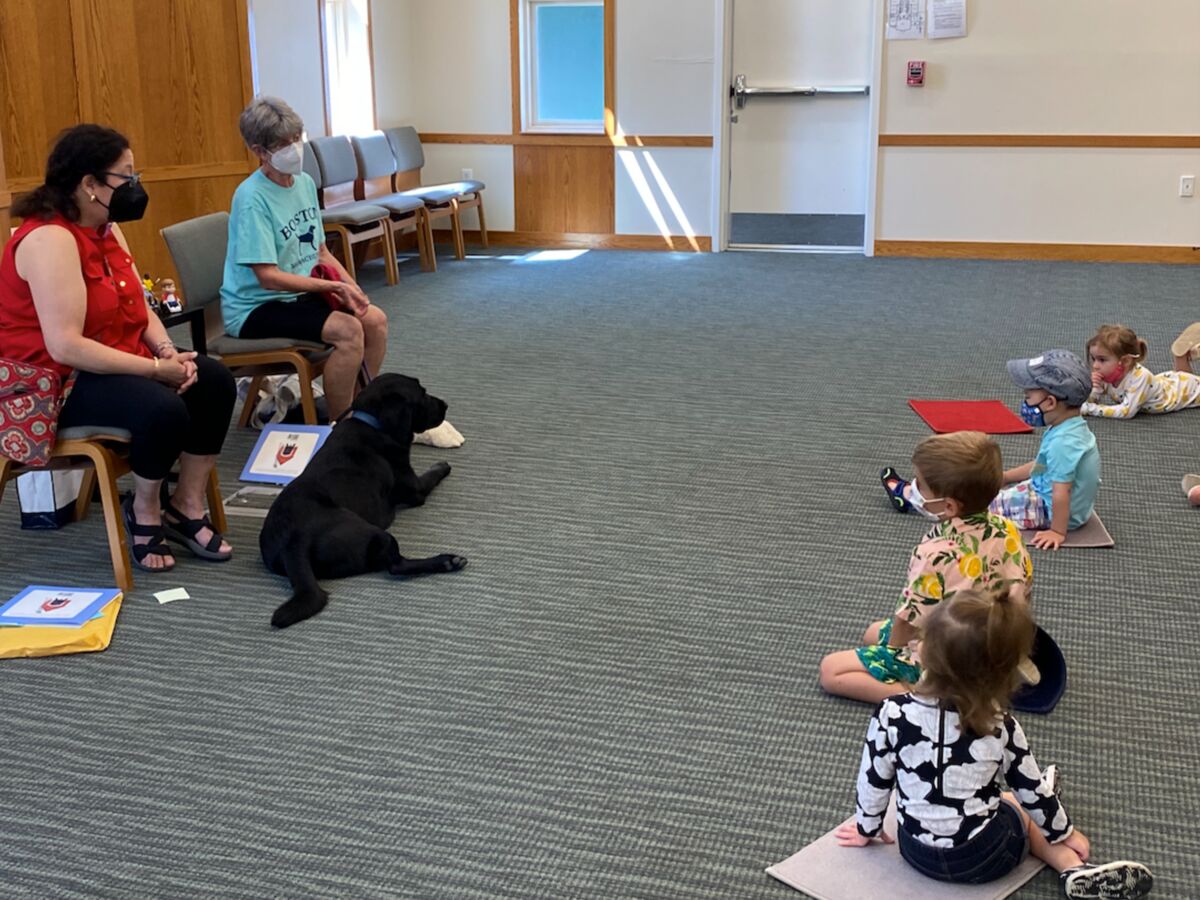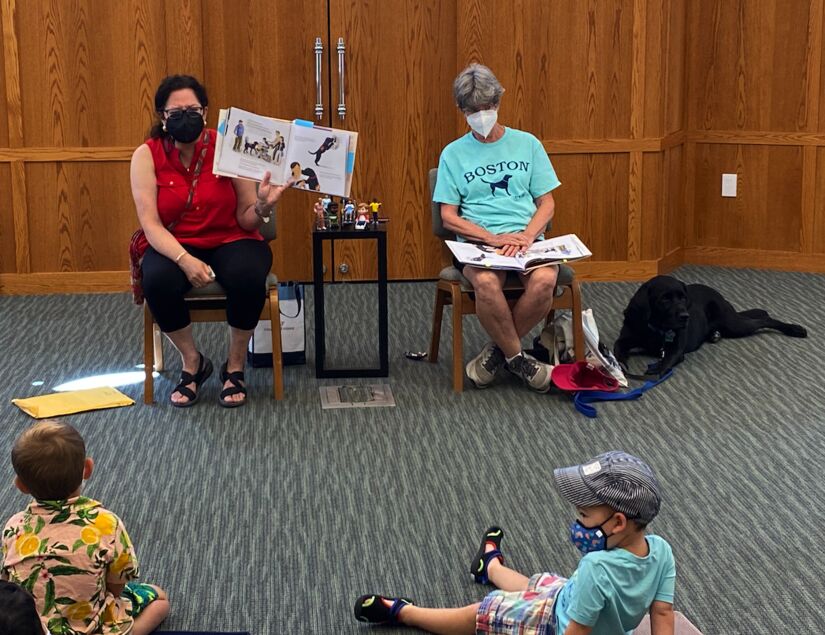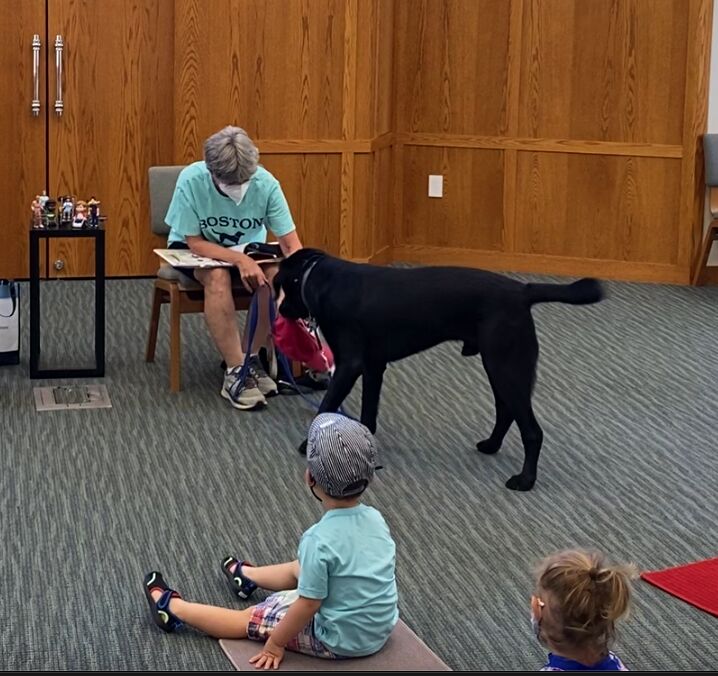Image


Children of Shalom Corner Early Learning Center spent a recent week learning about community helpers, and not all of them were human. After class discussions about how police, firefighters, postal workers, trash collectors and even chefs contribute to a strong community, the children had a visit from Gabriel, a black Labrador retriever, owned by Westwood resident Connie Rizoli.
On Friday, July 15, 2022, the lesson of the day concerned people with disabilities and their support animals. Ms. Rizoli visited the children of Shalom Corner with Gabriel, her pet, to give an in-person demonstration of how service dogs might help their people.
 Photo by Darlene Wong Cancell. Connie Rizoli sits with her dog, Gabriel.
Photo by Darlene Wong Cancell. Connie Rizoli sits with her dog, Gabriel.Gabriel is not a service dog, but Gabriel received service dog training. He was determined to be unfit as a service dog because he has allergies and he is afraid of loud noises. Service dogs must be expected to perform in all types of situations to help their humans. Therefore, these traits made him unplaceable, said Ms. Rizoli.
Only about 50 percent of dogs who enter the service dog training program successfully are placed, according to the Chief Development and Programs Officer for NEADS World Class Service Dogs, Cathy Zemaitis. NEADS is the organization from which Gabriel received his training.
For dogs like Gabriel who cannot be placed as service dogs, NEADS calls them “Furloughed Favorites," and has a program to ensure that they end up in loving homes. It was through the Furloughed Favorites program that Ms. Rizoli and her husband, Lou Rizoli, adopted Gabriel in December of 2018.
"He never wants to be alone. He loves people," says Ms. Rizoli, noting that Gabriel's service dog training meant being around people twenty-four hours a day, seven days a week. Gabriel's socialization began at three days old. As a puppy, he lived with a female inmate handler at MCI-Framingham. He stayed with the inmate on weekdays and was socialized to the world beyond prison walls by a family of NEADS "puppy raisers" on the weekends.
When Ms. Rizoli adopted Gabriel, she wrote a thank-you letter to his inmate caregiver. She imagined that Gabriel's adoption must be hard on someone who had raised him from the beginning. Ms. Rizoli promised his handler that she would take good care of him.
Although Gabriel is not a service dog, Ms. Rizoli still makes use of his service dog training. She has taken him to visit people at Westwood's Council on Aging, nursing homes, and now a preschool.
At Shalom Corner, the children gathered around Ms. Rizoli and Lynn Kaminski, the center’s director. Ms. Kaminski read the story of Rescue & Jessica, a picture book written by Jessica Kensky and Patrick Downes. The authors are spouses who survived the Boston Marathon bombing. Ms. Kensky lost both legs due to injuries suffered from the bombing. The real-life story describes how she is helped by her service dog, Rescue, who provides both emotional and physical support to Ms. Kensky.
 Photo by Darlene Wong Cancell. Director Lynn Kaminski reads the book, Rescue & Jessica, to a group of children.
Photo by Darlene Wong Cancell. Director Lynn Kaminski reads the book, Rescue & Jessica, to a group of children.As Ms. Kaminski read to the children, Ms. Rizoli pointed out similarities between Rescue and Gabriel. Ms. Rizoli demonstrated Rescue’s service dog tasks through Gabriel. She showed how a service dog might help retrieve a dropped item.
“Tug,” said Ms. Rizoli, throwing her baseball cap to the floor. Gabriel went to the hat, picked it up, and brought it back to Ms. Rizoli.
“If you were in a wheelchair and you dropped something and you couldn’t get it, a service dog could help you pick it up,” explained Ms. Kaminski. Later, after the end of the book, the children would be allowed to take turns throwing the hat to the floor for Gabriel to retrieve for them.
At another part of the story, Ms. Kaminski read about the way Rescue is able to help Ms. Kensky by picking up a ringing phone.
Ms. Rizoli demonstrated with her smartphone. She had placed it on the floor, a few feet in front of her. “Phone,” she said pointing at it. Gabriel followed her pointing hand, picked up the phone in his mouth, and brought it to Ms. Rizoli.
 Photo by Darlene Wong Cancell. Gabriel the dog obeys Connie Rizoli's command, "tug," and picks up her hat to return to her.
Photo by Darlene Wong Cancell. Gabriel the dog obeys Connie Rizoli's command, "tug," and picks up her hat to return to her.The entire process of training a dog like Rescue or Gabriel takes eighteen to twenty-four months. The pups begin their socialization at three-days old, when they are extensively handled to help them become accustomed to physical contact. Then, they move onto training, and stay full-time with a puppy raiser or handler. Around two years of age, training is complete.
The trained dogs are meticulously matched with a person who needs them, says Ms. Zemaitis. The person may be disabled, a child, a veteran, a trauma survivor, deaf or autistic. Both the new owner and the dog live together on NEADS Princeton campus in Massachusetts for two weeks, learning to work together. When the dog goes home with its human, NEADS continues to offer a support system during the dog's working lifetime.
In the case of Ms. Kensky, Ms. Zemaitis notes that it has been several years since Ms. Kensky adopted Rescue. Ms. Zemaitis notes that the quality of life that Ms. Kensky has been able to lead together with her husband and her helper, Rescue, is "active" and "full."
Ms. Rizoli has similarly positive feelings about Gabriel. Although she keeps him in practice with his service dog training, she doesn't need him to be anything more than her loving pet. When she and husband Lou adopted Gabriel, it just seemed right. He belongs with them.
Thanks to Lynn Kaminski, Shalom Corner Early Learning Center, Connie Rizoli, Cathy Zemaitis and Gabriel for sharing their news with Westwood Minute.